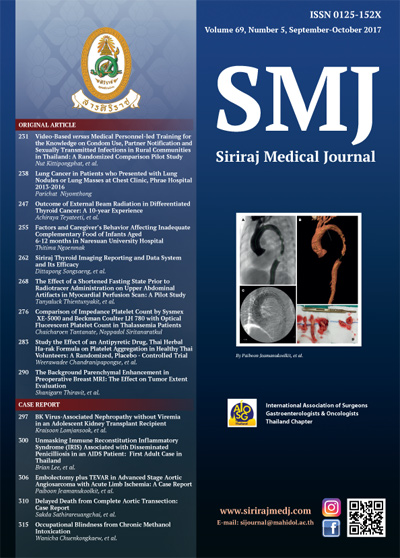Study the Effect of an Antipyretic Drug, Thai Herbal Ha-Rak Formula on Platelet Aggregation in Healthy Thai Volunteers: A Randomized, Placebo - Controlled Trial
Keywords:
Thai herbal formula, platelet aggregation, epinephrine, ADP, collagenAbstract
Background: Fever may alter platelet homeostasis leading to bleeding tendency. Thai herbal Ha-rak formula (HRF), a traditional Thai remedy consisting of five medicinal plants, is indicated for relieving fever. However, its effect on platelet has not been evaluated. This study aims to investigate the effect of HRF on platelet aggregation.
Methods: A randomized, placebo, controlled trial was carried out in 46-healthy Thai volunteers, both male and female. The subjects either received the maximum recommended dose per day of HRF (1,500 mg) or placebo. Platelet aggregation, using aggregometer (AggRam), was assessed in platelet rich plasma (PRP) in response to each
of three different agonists including epinephrine, adenosine diphosphate (ADP) and collagen at pre-dose and 8, 32 hours and 7-10 days after the first dose.
Results: All participants completed the study. Only few adverse events occurred which spontaneously improved without further treatment. Overall, analysis of platelet activity compared before and after HRF administration did not show significant difference of maximum percentage of platelet aggregation at any time point except the platelet
response to collagen at 32 hours and 1 week after the first HRF dose. However, subgroup analysis characterized by sex, and platelet aggregation in response to all agonists did not reveal any significant change. The same results applied to subgroup analysis based on the different patterns of platelet aggregation.
Conclusion: HRF at a dose of 1,500 mg/day is well tolerated and has a significant effect on platelet aggregation only when induced by collagen.
Downloads
Published
How to Cite
Issue
Section
License
Authors who publish with this journal agree to the following conditions:
Copyright Transfer
In submitting a manuscript, the authors acknowledge that the work will become the copyrighted property of Siriraj Medical Journal upon publication.
License
Articles are licensed under a Creative Commons Attribution-NonCommercial-NoDerivatives 4.0 International License (CC BY-NC-ND 4.0). This license allows for the sharing of the work for non-commercial purposes with proper attribution to the authors and the journal. However, it does not permit modifications or the creation of derivative works.
Sharing and Access
Authors are encouraged to share their article on their personal or institutional websites and through other non-commercial platforms. Doing so can increase readership and citations.











